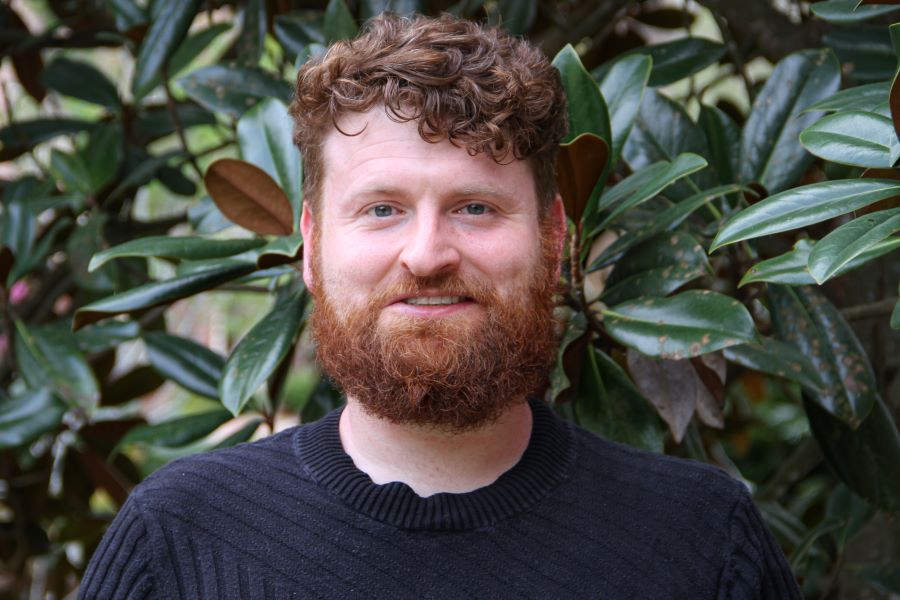Postdoc Spotlight: Andrew Flynn

Andrew Flynn is a postdoctoral scholar in the Department of Philosophy, part of Florida State University’s College of Arts and Sciences. Flynn specializes in ethics, moral psychology, and the philosophy of action and researches a variety of topics such as anger, contentment, motivation and virtue. He studies these elements in terms of how individuals find ways to cope with unfortunate events in modern society, such as inappropriate social behaviors or controversial governmental decisions.
Tell us a little about your background.
I grew up in Long Island, New York, about half an hour outside of New York City. I went to grade school, high school, and college in New York, pursuing my undergraduate degree at Columbia University as a double major in philosophy and history. After earning my degree in 2008, I worked in publishing while determining what I wanted to do moving forward. After a few years, I decided I wanted to go back to school and pursue my interest in philosophy more. This led me to the University of Wisconsin – Milwaukee where I earned my master’s degree in 2013. I then moved to the University of Pittsburgh where I worked towards my doctoral degree from 2013-14 and the University of California – Los Angeles where I earned my doctorate in Fall 2021.
What brought you to FSU?
FSU offered me a fantastic postdoctoral position, and I accepted because I saw the offer to be a wonderful opportunity. At FSU, there are a lot of scholars studying philosophy of action, ethics and philosophy of mind, all of which are topics that heavily overlap with my research interest in moral philosophy.
What inspired you to choose your specific area of research?
My area of research broadly revolves around moral philosophy. I have always had a very strong sense of right and wrong, even from a young age. Philosophers’ questions about morality can become complex, especially as one moves through this field, but to me, these questions have always been primal in daily life. I was always puzzled and perplexed when I would think about right and wrong. Overall, I never stopped questioning everything, and that is what led me to my current role as a postdoc in philosophy.
What aspect of your area of study do you find most fascinating?
It may seem abstract, but it is not a concrete thing in my work that I find most fascinating. What I find most fascinating is being able to make something truly explicit or explaining a complex human feeling or concept through words. This can be a gut feeling I do not know how to verbalize, but by using philosophical methods, I am able to explain and break down what I am thinking or feeling. I enjoy the process of bringing clarity to ideas or feelings that I know to be true but struggle to conceptualize through a less philosophical approach of thinking.
Can you give us an overview of a day in your life as a postdoc?
I teach on Mondays, Wednesdays and Fridays. Last semester, I taught two sections of the class ethical issues and life choices, which is an introductory undergraduate course involving ethics with a focus on applied cases. This semester I am teaching two sections of the introduction to philosophy course. When I am not teaching, I enjoy meals at the Suwanee room and focus on my writing and research in my office.
What do you value most about your collaboration with FSU faculty?
There are several faculty that have made FSU a tremendously friendly place for me. Edward Hinchman and John Schwenker, both FSU professors in philosophy, along with Zina Ward and Shivam Patel, assistant professors of philosophy, are people that I see all the time to eat dinner with and converse with about research. It can be challenging to move to a new place, but since I arrived at FSU in Fall 2022, the philosophy faculty have been nothing but amazing to me, both in a social sense and in that they are eager to mentor me in my work and overall career.
Following the completion of your postdoctoral appointment, what are your plans?
I plan to pursue a position in academia, specifically a tenure job in philosophy.
What advice would you offer to undergraduate students, graduate students, and fellow postdoctoral researchers?
If I were to give advice, I would say that it is important to work on topics that you are really interested in and to work hard at having a regular schedule. Research and writing should always be moving forward, even when the words do not seem to come to you easily.
